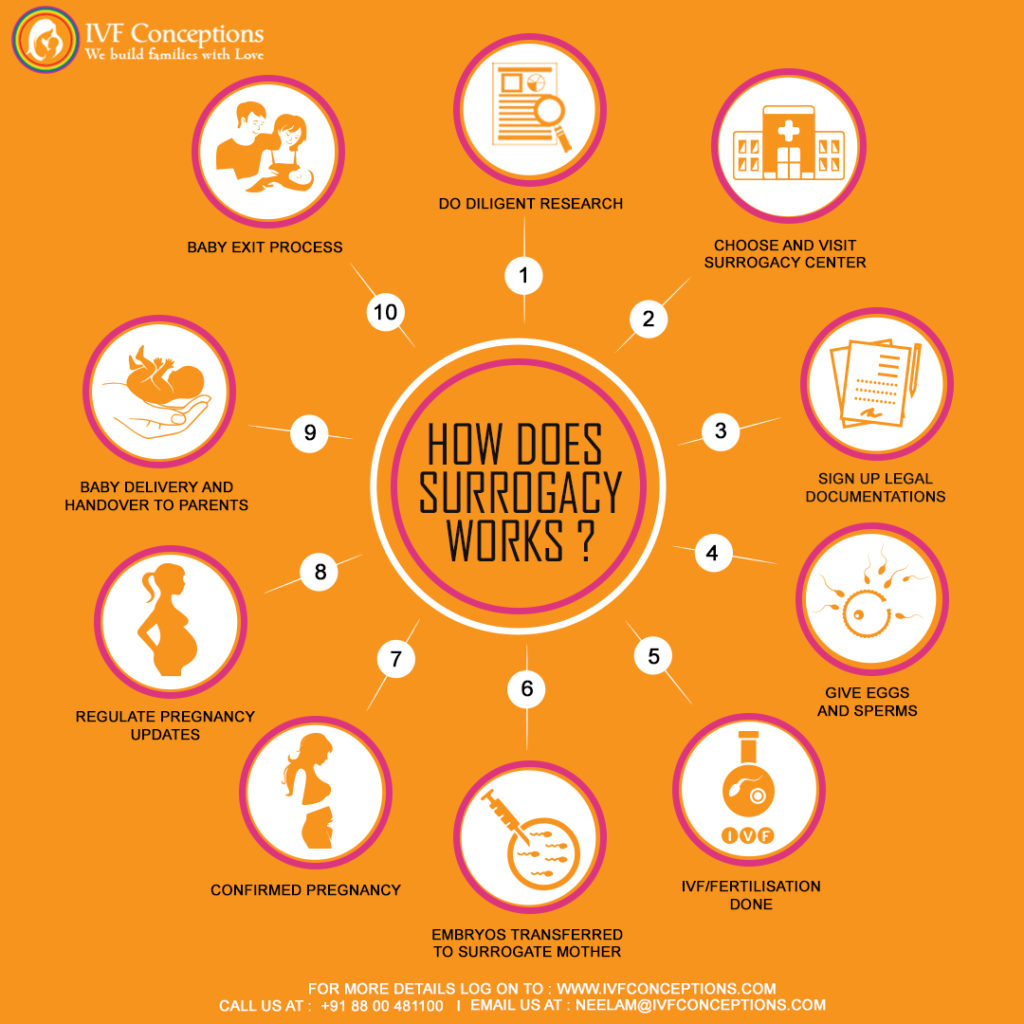When planning for surrogacy parenthood, research as much as possible and make an informed decision.

The word surrogacy is derived from a Latin word meaning substitute. In surrogacy, the surrogate agrees to carry the child for the intended parents until the birth of the child. But the gestational surrogacy process is not as easy as it seems. A typical gestational surrogacy consists of medical, legal, financial, and emotional intricacies. That is why intended parents are advised to research and educate themselves before embarking on the surrogacy journey. In this article, we will touch upon the “things to know before planning for surrogacy”.
Let’s touch upon the facts that expected parents know before planning for surrogacy.
Who should go through the process of surrogacy?
So, who should go through the process of surrogacy? Surrogacy can be a matter of choice or of a need. Following are the conditions in which the intended parents can go through the process of surrogacy –
- Same-Sex Couples – Gay couples’ surrogacy is an option in which a man uses surrogacy by donating their sperm to have their own child. They are taking the help of donated eggs and surrogate mothers to have a biologically related child.
- Advance age of mothers -In these cases where the female partner’s age is higher, carrying the pregnancy is riskier because carrying a baby may not be safer for the child or the mother. So, a woman in a higher age group can opt for gestational surrogacy to have a child of her own.
- Life-threatening conditions – There are certain medical factors that may make carrying the child too risky for the woman or child. Placenta Accreta is one of them.
- Unexplained infertility – Sometimes the patient has to go through 4 or 5 rounds of IVF cycles and still can’t carry a child either. In these cases where pregnant women are consistently struggling with miscarriages, gestational surrogacy can be a solution.
Recent trends in International Surrogacy and Reproductive Tourism
Reproductive tourism is the trend among infertility patients when they opt for crossing international boundaries to access reproductive technologies. The global commercial surrogacy industry is estimated to be worth around $6 billion annually. In India, surrogacy could be worth about $400 million annually, produced from the approximately 3,000 specialty clinics in the country. But the banning of foreign surrogacy in India has dropped the number of international couples seeking surrogacy in India. But they have other options to follow like- Ukraine and Georgia. For single males, surrogacy in Colombia and surrogacy in Mexico can be a good alternative to high-cost surrogacy in the US.
The US is the other major destination for surrogacy, with California and New Jersey leading states with surrogate births, each generating about 100 births each year.
Georgia, Ukraine, and Russia are other common suppliers of surrogates for an international market, while Colombia, Greece, the Czech Republic, and Poland are rapidly gaining the same status simultaneously.
Since 2002, commercial surrogacy was legal in India but since Oct 2015, foreign couples are not allowed to participate in any form of surrogacy in India. When customers cross an international border to engage a surrogate, they participate in the phenomenon, also called “cross-border reproductive care” (CBRC) or “fertility tourism,”
Things to know before opting for the process of surrogacy
Surrogacy is a tedious procedure medically, emotionally, and financially. This is the most common thing you may have heard about the process of surrogacy but there are other things as well that you should keep in mind. Some of them are –
#1. Surrogacy is of two types
Basically, there are two types of surrogacy – Gestational Surrogacy and traditional surrogacy. In gestational surrogacy, the surrogate is not biologically related to the child while in traditional surrogacy, there is a biological connection between the mother and the child.
When most people think of surrogacy they usually think of conventional or traditional surrogacy in which the intended father’s or donor sperm is used to fertilize the surrogate’s egg.
The surrogate has a genetic relationship with the child here since her egg is being used. Intrauterine insemination (IUI) is used to perform the procedure.
Nevertheless, the possibility of gestational surrogacy has also come into effect in recent decades. Through gestational surrogacy, the surrogate bears the infant born with the intended mother’s egg or from the donor’s egg and the intended father’s sperm or a donor’s sperm. The gestational carrier has no biological connection here with the child.
#2. Surrogacy isn’t for just the rich and powerful
We’ve heard of surrogacy many times, with only the rich and powerful. But this is not the case. We tend to hear more about surrogates so that their families can expand. So, surrogacy and intended parents are next-to-door things.
These people are from the same class as you are. But they may be waiting for some insurance coverage and all so they can go on with the surrogacy process. Read more about:
Celebrities who had a baby through surrogacy
Surrogacy costs are made affordable.
#3. Surrogate mothers become surrogates only for money
Compensation for most of the surrogates comes at the end of the list. It’s definitely not easy to be a surrogate. She has to follow the exact criteria to be a surrogate. She needs to adapt to her setting. She’s got to make some adjustments in her body and lifestyle.
So, not just the surrogates are here for the money. They are altruistic women who love the sensation of pregnancy.
However, in third-world countries, financial motivation is the main reason for surrogacy. The surrogate mother’s compensation in India is low, but it is enough to make her financially independent and do her own small-scale business.
#4. Working with a surrogacy agency can save money and time
Actually, the surrogate agency can play an important role in organizing your surrogacy. Whilst it may seem cost-effective to go individually for surrogacy, it is important to understand a surrogacy agency’s position.
A credited and experienced surrogacy professional can provide you with a range of services from screening and matching to legal and medical care. Therefore, you will actually benefit from the experience of the agency experts that will help you avoid pitfalls such as legal issues, failed medical testing, and issues of feasibility that could destroy your surrogacy journey.
#5. Surrogacy in the U.S. is not legal in all 50 states
While the U.S. is considered to be the world’s most friendly surrogacy country, some states in the U.S. still do not allow surrogacy in their states.
Each US State has its own rules and laws for the surrogacy process. Some of them are more friendly while others are less amiable. For example, states such as Illinois and California have made it compulsory to opt for gestational surrogacy while states such as New York and Michigan do not allow surrogacy to take place in their own state.
#6. Surrogacy costs can vary
The surrogacy cost differs from place to place. For example, in Ukraine, it is $50,000, in the USA it is $130,000, in Colombia it costs $64,0000, in Canada it is $80000, in the UK it costs $85000, in Kenya it is $45000 and in India, it costs $45,000. The surrogacy cost includes everything ranging from agency fees, legal costs, surrogate search, clinical costs, immigration help, prenatal care, and delivery. It also includes the surrogate mother’s pay.
Learn more if you are planning for surrogacy:
How much does surrogacy cost in Ukraine?
How much does surrogacy cost in Georgia?
How much does surrogacy cost in India?
How much does surrogacy cost in Russia?
#7. Surrogacy may involve some risks
Like any other natural pregnancy, surrogate pregnancies entail the same medical risks of carrying and giving birth to a child.
These may include morning sickness nausea, swelling, back pain, weight gain, heartburn, and other unpleasant side effects.
Some more serious side effects are disorders that can grow in your reproductive organs during pregnancy, such as gestational diabetes, hypertension, or potential damage. Like any pregnancy, the risk of a miscarriage of surrogacy or preterm labor is also present.
#8. Surrogacy can turn into multiple pregnancies
Historically, multiple pregnancies with an in-vitro (IVF) cycle were not uncommon. The reason for that was due to the transfer of more than one embryo. Several embryos were transferred to each IVF patient in order to compensate for lower implantation levels for individual embryos and to achieve reasonable pregnancy rates. IVF thus had a higher chance of multiple pregnancies. But with current advanced technology, most infertility experts prefer the transfer of a day 5 embryo, known as a blastocyst, which has a higher success rate and thus fewer chances of multiple births.
Conclusion
Are you planning for surrogacy, we are here to guide and support you right from selecting the right programs, surrogacy country, and experienced surrogacy agency.
If you’d like to learn more about IVF, Egg Donation, or surrogacy services globally, check out the rest of our website at IVF Conceptions. We offer legally secure and affordable surrogacy consulting services for FREE.
I am Neelam Chhagani, a chief Surrogacy Consultant, representing IVF Conceptions, with more than 10 years of experience in international surrogacy. It will be my great pleasure to assist you. With vast experience and deep subject knowledge, I guide and support intended parents, understanding the surrogacy process in terms of process, costs, and legalities country-wise and then manage their journey with one of our programs/partners worldwide. So, basically, saving their ton of research time and money and thus, channelizing you toward the right direction.


